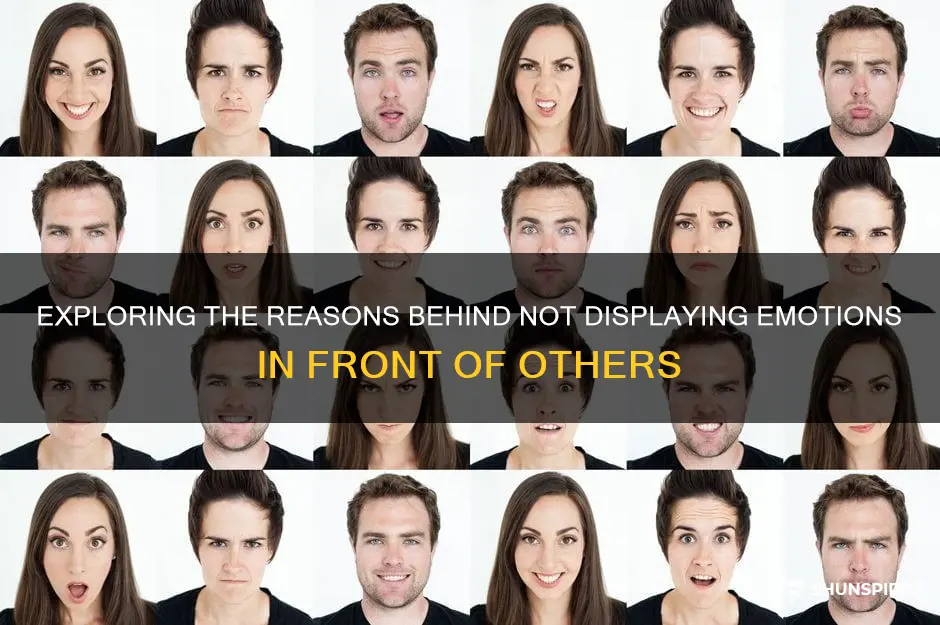
Have you ever wondered why some people seem to always keep their emotions under lock and key, rarely showing any hint of how they truly feel? It's an intriguing aspect of human behavior that leaves us wondering why certain individuals choose to conceal their emotions in front of others. Is it self-control, fear of vulnerability, or perhaps a desire to maintain a sense of strength and composure? Join me as we delve into the psychology behind the enigma of emotionless individuals and explore the reasons why they prefer to keep their feelings hidden from the world.
What You'll Learn

Personal and cultural factors influencing emotional expression in public
Personal and cultural factors play a significant role in influencing how we express our emotions in public. While some individuals are naturally more open about their feelings, others may find it challenging to show emotion in front of others. If you often find yourself struggling to express your emotions, it is essential to understand the underlying factors that may be affecting your behavior.
Personality Traits:
Certain personality traits, such as introversion or being emotionally reserved, can make it difficult for individuals to display emotions publicly. These individuals tend to be more introspective and value their privacy, which can translate into a reluctance to express their emotions openly. It's important to recognize that everyone has their unique way of processing and displaying emotions, and introverts may express their feelings more subtly or internally.
Upbringing and Cultural Background:
The way we are raised and our cultural background can significantly influence how we express emotions in public. Different cultures have varying norms and expectations when it comes to displaying emotions. Some cultures encourage people to be expressive and emotionally open, while others place a greater emphasis on maintaining composure and self-control. If you come from a background that values emotional restraint, it is not uncommon to find it challenging to express your feelings openly in public.
Fear of Judgment:
One common reason why individuals may struggle to show emotions in front of others is the fear of being judged or misunderstood. This fear can stem from past negative experiences or a belief that expressing vulnerability may be perceived as a sign of weakness. Overcoming this fear requires building self-confidence and learning to embrace vulnerability as a strength rather than a weakness. It can be helpful to surround yourself with individuals who are supportive and understanding, creating a safe environment where you feel comfortable expressing your emotions.
Lack of Emotional Awareness:
Some individuals may struggle to express their emotions in public due to a lack of emotional awareness. They may find it challenging to identify and understand their feelings, making it hard to express them to others. Developing emotional intelligence and self-awareness can be beneficial in overcoming this barrier. Engaging in activities such as journaling, therapy, or mindfulness exercises can help you become more attuned to your emotions and provide you with the tools to express them effectively.
Coping Mechanisms:
In some cases, individuals may suppress or hide their emotions as a coping mechanism. This may be a result of past traumas or negative experiences where expressing emotions was discouraged or met with negative consequences. Using avoidance or numbing strategies to deal with emotions can be detrimental to mental and emotional well-being. Seeking professional help, such as therapy, can aid in identifying and addressing these underlying issues and develop healthier coping mechanisms.
It is important to remember that there is no one-size-fits-all approach to expressing emotions in public. It is a personal journey that requires self-reflection, understanding, and acceptance. By recognizing and addressing these personal and cultural factors, you can begin to unlock your ability to express your emotions more comfortably and authentically in public settings. Embracing vulnerability and expressing your feelings can lead to healthier relationships, greater self-acceptance, and an overall improved sense of well-being.
The Tragic Cycle: The likelihood of Emotional Abuse Victims Falling into a Perpetual Cycle of Abuse
You may want to see also

Fear of vulnerability and potential judgement from others
- Acknowledge your fear: The first step in overcoming any fear is acknowledging its existence. Take a moment to identify and accept that you have a fear of vulnerability and potential judgement from others. Understanding the root of this fear can help you start to develop strategies to overcome it.
- Challenge your thoughts: Often, our fears are based on negative thoughts and beliefs that are not grounded in reality. For example, you may have thoughts such as "If I show emotion, people will think I'm weak" or "I don't want to be a burden to others." Challenge these thoughts by questioning their validity. Are they based on evidence or are they just assumptions? More often than not, you will realize that these thoughts are unfounded and that people around you are more accepting and supportive than you think.
- Start small: Overcoming fear takes time and practice. Begin by allowing yourself to show small, subtle emotions in front of others. This could include smiling when you're happy or nodding your head when you agree with something. As you become more comfortable with these small displays of emotion, gradually work your way up to expressing more intense emotions like sadness or anger.
- Surround yourself with supportive people: Having a supportive network of people around you can make a huge difference when it comes to overcoming your fear of vulnerability. Seek out friends and family members who are empathetic, understanding, and non-judgmental. Share your struggles with them and ask for their support. Knowing that you have people who will accept and validate your emotions can help boost your confidence and make it easier for you to show emotion in front of others.
- Practice self-compassion: It's important to remember that it's okay to feel and express emotions. Remind yourself that emotions are a natural part of being human and that showing vulnerability is a sign of strength, not weakness. Treat yourself with kindness and compassion, and give yourself permission to be open and authentic with others.
- Seek therapy or counseling: If your fear of vulnerability is deeply rooted and interfering with your daily life, consider seeking professional help. A therapist or counselor can help you uncover the underlying causes of your fear and provide you with specific tools and strategies to address it. They can also provide a safe and non-judgmental space for you to express and process your emotions.
Remember, overcoming the fear of vulnerability and potential judgement from others is a journey. Be patient with yourself and celebrate every small step you take towards being more open and authentic with others. By gradually exposing yourself to vulnerability and practicing self-compassion, you can break free from the grip of fear and allow yourself to fully express and experience your emotions.
Why Emotional Intelligence is Important for Your Child's Development
You may want to see also

Strategies for coping with emotions privately rather than externally
Emotions are an important aspect of human life. They allow us to connect with others, express our needs, and navigate the ups and downs of everyday life. However, some people find it difficult to show their emotions in front of others. This could be due to a variety of reasons, such as cultural upbringing, fear of judgment, or a desire to maintain control. If you struggle with showing your emotions in front of people, here are a few strategies that can help you cope privately rather than externally.
- Create a safe space: Find a quiet and comfortable space where you feel safe and secure. It can be a specific room in your house or even a secluded spot in nature. This space will act as your sanctuary, allowing you to freely express your emotions without fear of judgment or interruption.
- Journaling: Writing down your emotions in a journal can be a powerful way to process and cope with them privately. Write freely, without censoring yourself. Let your pen flow and express everything that comes to mind. This practice can help you gain clarity and insight into your emotions.
- Meditation and mindfulness: Develop a regular meditation or mindfulness practice. These practices allow you to observe your thoughts and emotions without judgment. By focusing on your breath or a specific sensation, you can create a sense of inner calm and acceptance. This can help you cope with your emotions in a private, internal way.
- Engage in a creative outlet: Find a creative outlet that allows you to express your emotions non-verbally. This could be painting, dancing, playing a musical instrument, or any other form of artistic expression. Engaging in a creative activity can help you channel your emotions into something tangible and meaningful.
- Seek support from a trusted confidant: While you may not feel comfortable showing your emotions in front of everyone, it can be helpful to have at least one person you can confide in. Find someone you trust, such as a close friend or family member, and share your emotions with them in a private setting. Having a supportive listener can provide validation and comfort.
- Practice self-care: Prioritize self-care activities that help you cope with your emotions in a private and nurturing way. This could involve taking a warm bath, going for a nature walk, practicing yoga, or engaging in any activity that helps you relax and recharge. Taking care of yourself physically, mentally, and emotionally will provide you with the strength and resilience to cope with your emotions privately.
- Seek professional help: If your struggle with showing emotions in front of others is causing distress or affecting your daily life, consider seeking help from a mental health professional. A therapist or counselor can provide personalized strategies and support to help you navigate and cope with your emotions more effectively.
Remember, everyone copes with and expresses emotions differently. It's important to find strategies that work for you and make you feel comfortable. By practicing self-awareness, self-acceptance, and utilizing these coping strategies, you can find healthy and private ways to navigate and express your emotions.
The Connection Between Intelligence and Emotional Intelligence: Exploring the Correlation
You may want to see also

Impact of societal expectations and gender norms on emotional display
In our society, there are certain expectations and norms regarding the display of emotions. These expectations can vary depending on cultural norms, social background, and even gender. For many individuals, these societal expectations and gender norms can have a significant impact on their emotional display, leading to a lack of emotion shown in front of others.
One of the reasons why someone might not show emotion in front of people is the fear of being judged or perceived as weak. Society often expects individuals to be strong, composed, and in control of their emotions. Particularly for men, showing vulnerability or displaying emotions such as sadness or fear can be seen as a sign of weakness, leading many men to suppress their emotions. As a result, they may avoid showing any emotion in front of others, even in situations where it would be completely natural and healthy to do so.
Women, on the other hand, might face different societal expectations when it comes to emotional display. While women are often seen as more emotional and are sometimes granted more leniency in expressing their feelings, they also face the risk of being labeled as overly emotional or irrational. This can lead to a fear of negative judgment or dismissal, causing some women to hide their emotions and present a stoic front to the world.
In addition to societal expectations, past experiences and personal beliefs can also play a role in an individual's lack of emotional display. Traumatic experiences, for example, can lead someone to numb their emotions as a coping mechanism to protect themselves from further pain. Similarly, some individuals may have grown up in households where emotions were not openly expressed or were discouraged, leading to a learned behavior of suppressing emotions.
It is important to recognize that these societal expectations and gender norms can have a negative impact on individuals and their emotional well-being. Suppressing emotions can lead to increased stress, anxiety, and feelings of isolation. It is crucial to create a safe and supportive environment where individuals feel comfortable expressing their emotions, regardless of societal expectations or gender norms.
If you find yourself struggling to show emotion in front of others, here are some steps you can take to address this issue:
- Reflect on societal expectations: Take some time to reflect on the societal expectations and gender norms that might be influencing your behavior. Recognize that these expectations are not necessarily a reflection of reality but rather a construct that can limit your emotional expression.
- Challenge negative beliefs: Challenge any negative beliefs or judgments you may have about showing emotions. Remember that vulnerability is not a weakness but a strength, and allowing yourself to express your emotions can lead to healthier relationships and a greater sense of well-being.
- Seek support: Reach out to trustworthy individuals in your life who can provide support and understanding. Share your feelings and emotions with them, and allow yourself to be vulnerable. Surrounding yourself with a supportive network can make it easier to express emotions.
- Practice self-compassion: Be kind and understanding to yourself. Understand that it is okay to have emotions and that it is a natural part of being human. Treat yourself with the same compassion and understanding that you would offer to a friend or loved one.
- Seek professional help if needed: If you find that suppressing your emotions is significantly impacting your daily life and well-being, consider seeking the help of a therapist or counselor. They can provide you with valuable tools and strategies to navigate societal expectations and express your emotions in a healthy way.
In conclusion, societal expectations and gender norms can have a significant impact on an individual's ability to show emotions in front of others. It is important to challenge these expectations, seek support, and practice self-compassion in order to create a healthier and more emotionally fulfilling life. Remember that expressing emotions is a natural and necessary part of being human, and by embracing and acknowledging your emotions, you can foster deeper connections and enhance your overall well-being.
Mastering the Art of Texting with Emotional Intelligence
You may want to see also
Frequently asked questions
There could be various reasons for not showing your emotions in front of others. It could be due to past experiences that have made you feel vulnerable or judged, a fear of being perceived as weak, or simply a personal choice to keep your emotions private.
Yes, it is normal for some individuals to not show their emotions in front of others. People have different ways of expressing and dealing with their emotions. Some individuals may prefer to keep their emotions private, while others may express them more openly.
Not showing emotions can impact your relationships in various ways. It might make it harder for others to understand and relate to you, leading to a sense of disconnect. It could also make it difficult for others to provide support or comfort when you need it. Additionally, it might create misunderstandings or cause others to perceive you as distant or uninterested.
Not showing emotions can have its advantages. It can provide a sense of control and prevent others from taking advantage of your vulnerabilities. It can also help you maintain a professional or composed image in certain situations. However, it's important to find a balance and still express your emotions in appropriate ways to maintain healthy relationships.
If not showing emotions in front of others is causing distress or negatively impacting your relationships, it may be worth exploring why this is the case. Consider seeking support from a trusted friend, family member, or mental health professional who can help you identify any underlying issues and develop healthier ways to express and manage your emotions.







